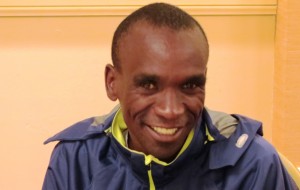Experience May Give Eliud Kipchoge Edge Over Kenenisa Bekele At Chicago Marathon
By David Monti, @d9monti
(c) Race Results Weekly, all rights reserved
CHICAGO (11-Oct) — When Eliud Kipchoge won the world 5000m title in 2003 at the tender age of 18, he stunned the fans who packed the Stade de France in Paris hoping that their city would be awarded the 2012 Olympic Games. More than 11 years later –and still not yet 30– he is a far more mature athlete who has mastered every distance up to the marathon, underscored by his 2:04:05 personal best from Berlin last year.
“Actually, the journey is not easy, the way I got here,” Kipchoge told Race Results Weekly here yesterday in advance of Sunday’s 37th Bank of America Chicago Marathon where he is one of the favorites for victory. “The journey has been rough. In sport, today you are up, tomorrow you are down, and you need to accept that.”
Unlike the current trend where African athletes are moving to the marathon at a young age, Kipchoge has taken a much more deliberate path to the 42.195-kilometer distance. Under the guidance of his Dutch manager, Jos Hermens, Kipchoge stuck with the track, cross country, and road racing at shorter distances to develop more fully as an athlete, first. In addition to his 5000m world title in Paris, Kipchoge was the silver medalist at 5000m at the Beijing Olympics in 2008 (he also won bronze in Athens in 2004), and collected a silver medal over the same distance at the 2007 IAAF World Championships, and a bronze medal at 3000m at the 2006 IAAF World Indoor Championships. He has eye-popping personal bests of 7:27.66 for 3000m (#5 Kenyan all-time), 8:07.39 (indoors) for two miles, 12:46.53 for 5000m (#2 Kenyan all-time) and 26:49.02 for 10,000m.
Kipchoge gave up his track career in 2013, but he did not debut in the marathon at one of the World Marathon Majors, or any of the “speed” marathons like Dubai or Rotterdam where a phalanx of pacemakers attempt to drag athletes to near-world times. Instead, he ran his first marathon at the less-known Haspa Hamburg Marathon in Germany in April, 2013, the same day as the much more competitive Virgin Money London Marathon. Against a weak field, he ran a well-controlled 2:05:30 to win by two minutes, an effort that solidified the idea in his mind that he had made a successful leap to the distance.
“What has been carrying me through for the ten years for my career, coming to marathon, actually planning, and also self-discipline,” he explained.
Kipchoge also has the benefit of excellent coaching and a training group of top marathoners. He is coached by Patrick Sang, one of Kenya’s best-ever steeplechasers, twice the IAAF World Championships silver medalist (1991 and 1993) and the 1992 Olympic silver medalist. His regular training partners are world and Olympic Marathon champion Stephen Kiprotich and 2012 Tokyo Marathon champion Michael Kipyego, both of whom remain at their camp in Kaptagat, Kenya, training for the TCS New York City Marathon on November 2.
“Actually, my training group is fantastic,” said Kipchoge, the father of two boys and one girl. “They understand their plan and coach. They respect each other. That’s why we are successful.”
Kiprotich, the first Ugandan to win an Olympic Marathon, is particularly inspiring for Kipchoge.
“Personally, I love training with Stephen, who is Olympic and world champion in the marathon. “He’s a good man. Actually, he gives us confidence to still stick with this sport.”
When asked if he is ready to face three-time Olympic gold medalist Kenenisa Bekele here on Sunday, his main rival for victory, Kipchoge did not hesitate to answer.
“Yes,” he said, making direct eye contact with a reporter. “My training for the last month and a half was good.” He added, about Bekele: “I’m actually happy to race him on Sunday.”
Success in a marathon can be measured several ways: a victory, a fast time, or beating a certain athlete, for example. Kipchoge, who said a 61:40 first half would be comfortable, has his own way of defining success.
“I’m guided by a philosophy which says winning, actually, is not important,” Kipchoge intoned. “But, how to prepare to win is critically important. That means, that maybe if I run a good time, I win.”




